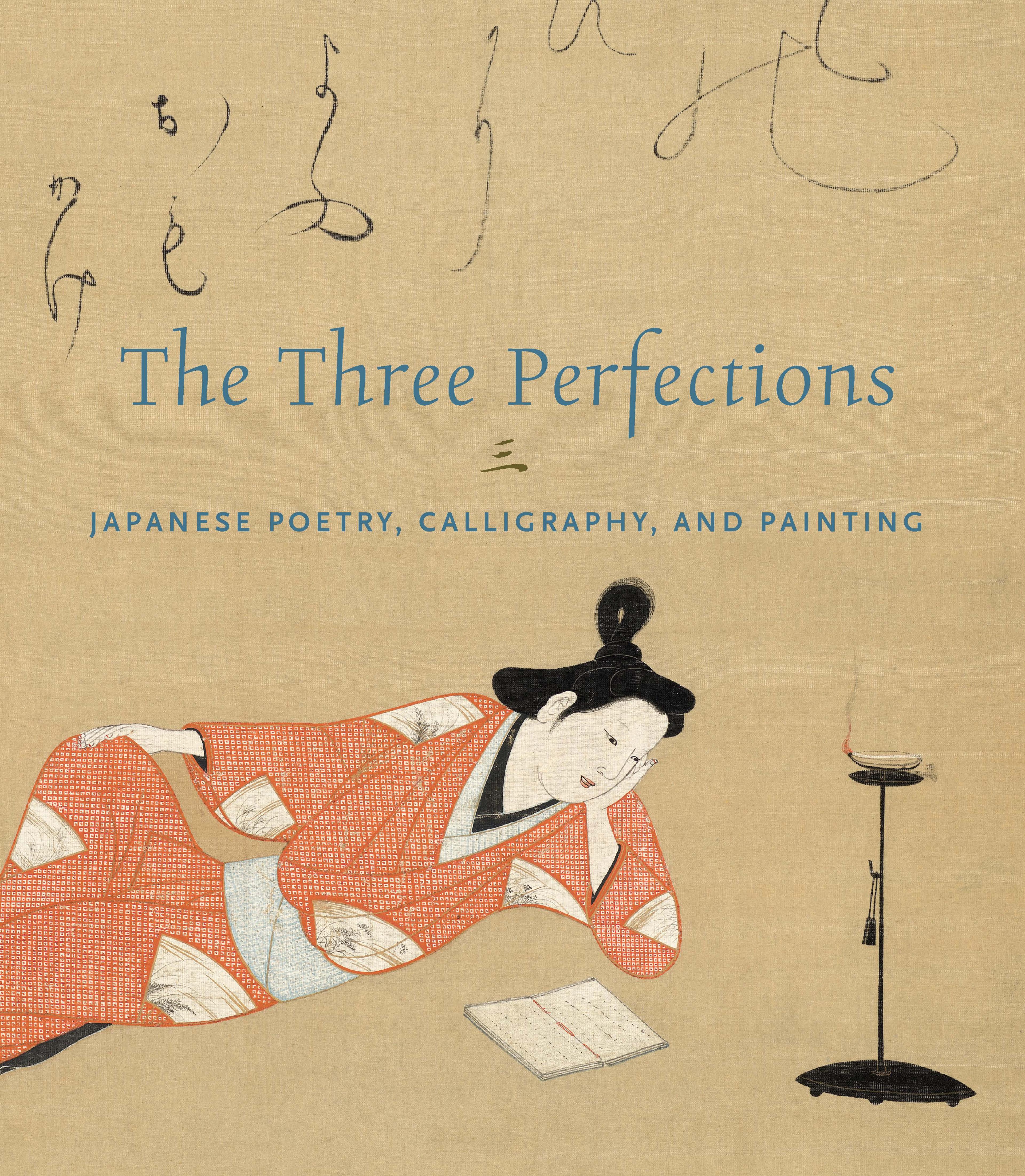Chinese Poem to Celebrate a Senior Monk’s Sixtieth Birthday
The Ōbaku Zen monk Duzhan Xingying, better known as Dokutan Shōkei in Japan, has brushed two long and one short columns of bold, Ming-style cursive calligraphy to transcribe a Chinese poem composed in eight lines, five syllables each. Balanced on the left is a half-column of characters, of the same size and style, comprising the calligrapher’s signature. The verse was composed on the occasion of another (unnamed) monk’s sixtieth birthday—no doubt someone senior to Duzhan in the monastic ranks—and eulogizes the subject using natural metaphors such as the clear moonlight (a symbol of Buddhist wisdom) and the vocabulary of the transmission of the Dharma (Buddhist Law). Though brushed with unrelenting energy, each character remains in its own self-contained orbit of energy, with only seven pairs of characters connected by a brushstroke; nowhere are more than two characters connected. The ink tonality remains even throughout. In some characters the influence of Song literati calligraphers such as Huang Tingjian (1045–1105) can be detected, such as the way the downward slanting strokes of the character zen 全 , just below the middle of the second column, are boldly drawn. For that character, the tip of the brush hidden upon entry and also as it finishes the stroke, without pointed tips, but rather with nearly squared-off edges. Then the tip of the the next character shō 彩, creating a delightful contrast of delicacy and boldness as well as ink density. The alternation of “dry” and “wet” brush marks as the calligrapher allows his brush to go dry before re-inking is effectively brought to bear throughout the composition, and lends a sensation of spontaneity to the composition.
The poem can be deciphered and translated as follows:
六旬寫仙籙
兼寫正法堂
桂月光天德
水雲護寳坊
祖燈光益熾
心地印全彰
華藏門大啓
普薰法乳香
右蒲茅獨湛性瑩和南草
For your venerable sixtieth birthday
I inscribe an account of a sage,
While also paying homage
to our Dharma Hall.
The mid-autumn osmanthus moon
illuminates Heaven’s virtue
As waves of clouds form a canopy
protecting our sacred monastery.
The light of the lantern of the Patriarchs
burns ever so brightly,
And the seal of the transmission of mind
manifests itself completely.
The gate of the monastery,
has been opened wide
So all can bask in
the fragrance of the Dharma.
[The poem] on the right was respectfully brushed by the recluse Dokutan Shōkei
(Trans. Xiaohan Du)
Duzhan (Dokutan) was born in Xinghua prefecture of Fujian province. He followed his master Yinyuan (Ingen) to Japan, and became his Dharma heir in the year 1664. He was the founding abbot of Shosan Hōrinji Temple 初山宝林寺 in Shizuoka prefecture, and then was appointed the fourth-generation head of the Ōbaku sect in 1682, as alluded to in one of the seals impressed on this work. Duzhan was famous for practicing the teaching of both Zen and Pure Land sects, and came to known in Japan as Nenbutsu Dokutan 念仏独湛, or “Dokutan who recites the Nenbutsu” (repeating the name of Amida Buddha as an act of devotion).
The poem can be deciphered and translated as follows:
六旬寫仙籙
兼寫正法堂
桂月光天德
水雲護寳坊
祖燈光益熾
心地印全彰
華藏門大啓
普薰法乳香
右蒲茅獨湛性瑩和南草
For your venerable sixtieth birthday
I inscribe an account of a sage,
While also paying homage
to our Dharma Hall.
The mid-autumn osmanthus moon
illuminates Heaven’s virtue
As waves of clouds form a canopy
protecting our sacred monastery.
The light of the lantern of the Patriarchs
burns ever so brightly,
And the seal of the transmission of mind
manifests itself completely.
The gate of the monastery,
has been opened wide
So all can bask in
the fragrance of the Dharma.
[The poem] on the right was respectfully brushed by the recluse Dokutan Shōkei
(Trans. Xiaohan Du)
Duzhan (Dokutan) was born in Xinghua prefecture of Fujian province. He followed his master Yinyuan (Ingen) to Japan, and became his Dharma heir in the year 1664. He was the founding abbot of Shosan Hōrinji Temple 初山宝林寺 in Shizuoka prefecture, and then was appointed the fourth-generation head of the Ōbaku sect in 1682, as alluded to in one of the seals impressed on this work. Duzhan was famous for practicing the teaching of both Zen and Pure Land sects, and came to known in Japan as Nenbutsu Dokutan 念仏独湛, or “Dokutan who recites the Nenbutsu” (repeating the name of Amida Buddha as an act of devotion).
Artwork Details
- 独湛性瑩筆 五言律詩
- Title: Chinese Poem to Celebrate a Senior Monk’s Sixtieth Birthday
- Artist: Duzhan Xingying (Japanese: Dokutan Shōkei) (Chinese, 1628–1706)
- Period: Edo period (1615–1868)
- Date: late 17th–early 18th century
- Culture: Japan
- Medium: Hanging scroll; ink on paper
- Dimensions: Image: 50 9/16 × 16 in. (128.5 × 40.7 cm)
Overall with mounting: 87 3/8 × 21 3/4 in. (222 × 55.2 cm)
Overall with knobs: 87 3/8 × 23 7/8 in. (221.9 × 60.6 cm) - Classification: Calligraphy
- Credit Line: Mary and Cheney Cowles Collection, Gift of Mary and Cheney Cowles, 2020
- Object Number: 2020.396.9
- Curatorial Department: Asian Art
More Artwork
Research Resources
The Met provides unparalleled resources for research and welcomes an international community of students and scholars. The Met's Open Access API is where creators and researchers can connect to the The Met collection. Open Access data and public domain images are available for unrestricted commercial and noncommercial use without permission or fee.
To request images under copyright and other restrictions, please use this Image Request form.
Feedback
We continue to research and examine historical and cultural context for objects in The Met collection. If you have comments or questions about this object record, please contact us using the form below. The Museum looks forward to receiving your comments.
